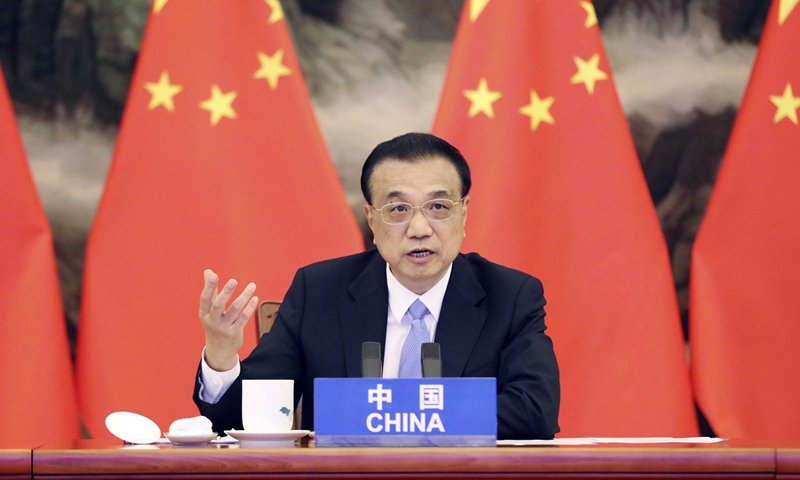The Regional Comprehensive Economic Partnership (RCEP) was signed on Sunday by the 15 participating countries via video conference, attracting intensive attention from global public opinion.
Chinese Premier Li Keqiang said that the RCEP is “a victory of multilateralism and free trade.” Leaders of other countries who participated in the meeting made similar comments.
We have noticed that many Asian media outlets have welcomed the RCEP and analyzed in their reports how the agreement will improve regional economic and trade cooperation, as well as how it will benefit their countries.
However, some Western media outlets reported that the RCEP is “China-led” or is intended to expand China’s influence in Asia, describing China as the biggest beneficiary of the RCEP. From such a geopolitical perspective, they only see that China is in this agreement while the US is not, thus ignoring the RCEP’s rich and true constructiveness to the whole region and misunderstanding China’s interaction with the world in the 21st century.
The RCEP was initiated by ASEAN. China, Japan, South Korea, India, Australia and New Zealand were invited to participate. India decided to withdraw at the last moment of the negotiations in November 2019. Many major US allies in the Asia-Pacific region are in this agreement, and China cannot dominate the attitude of these countries or the ASEAN’s attitude. However, some US and Western elites still believe that China is the “biggest winner” of the RCEP.
There are problems with those people’s value system and ability to judge. Their prejudices against China are so deep that their minds become confused whenever China is involved in anything. If China is the so-called winner this time, then it is a win-win situation for all other RCEP members because these countries have strived for their own benefits during the past eight years of negotiations. All countries can only be winners of this agreement.
This is the fundamental way for China’s development. China has been seeking a win-win and all-win mode from the very beginning and, like rolling snowballs, has accumulated a large number of common interests around the world. China has always been able to cooperate with the US and its China-wary allies in an effective and mutually beneficial way, prompting international relations to make a big move forward from the old geopolitical direction toward all-win cooperation.
The global map of interests is no longer painted on the basis of spheres of influence. The enrichment and expansion of sovereignty and technological progress make it possible for countries to seek new sources of interests in every part of the world. With the general decline of security threats, economic interests have become more prominent and all countries prioritize economic and social development in their national interests. At the very least, sacrificing the economy for the sake of security is increasingly difficult to justify as a realistic policy.
Some US and Western elites are indeed behind the times in their way of thinking – they think of China as an “expansionist empire” and see all China’s expanded cooperation with whichever country or region as part of its “expansion strategy.” In fact, they have really misread China, the times as well as the world.
The RCEP is an open, reciprocal and mutually beneficial cooperation system that will profit the 2.2 billion people in the whole region. The external economic environment which every enterprise and consumer group is connected with has been greatly broadened and they see more opportunities to unlock their development potential. When the businesses and consumers are getting better and better, how could the interests of the nations be harmed?
To sum up, the RCEP proves that the so-called Chinese ambitions and the so-called Chinese expansion in the eyes of some US and Western elites are mixed with too many of their subjective prejudices. In comparison, they also need to reflect on how they have distorted the China-proposed Belt and Road Initiative (BRI) and why the initiative they have been slandering is actually so popular in the vast majority of countries along the BRI route – those countries can’t be the fools the US and Western elites have thought they are.
There is no need to overestimate the significance of the RCEP. But it will undoubtedly enhance Chinese people’s confidence by showing us that multilateralism is still full of vitality and there is still broad room for us to participate in it. We have so far adhered to the path of mutual benefit and win-win development, and this has turned out to be successful. We will continue to follow the path, and no one can stop us.


